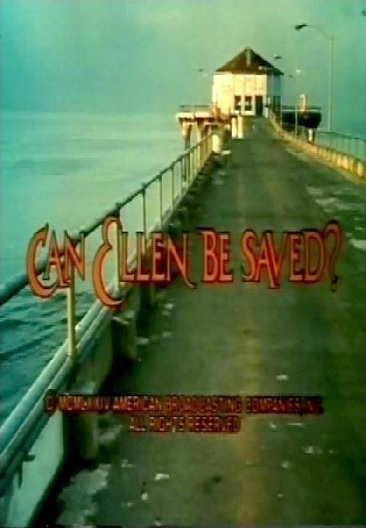Welcome to Retro Television Reviews, a feature where we review some of our favorite and least favorite shows of the past! On Sundays, I will be reviewing the made-for-television movies that used to be a primetime mainstay. Today’s film is 1974’s Can Ellen Be Saved! It can be viewed on YouTube!
Ellen Lindsey (Katharine Cannon) is an intelligent but depressed teenager who feels that she just doesn’t belong anywhere in the world. She’s not interested in the money and class-obsessed lifestyle of her parents, Arnold (Leslie Nielsen, back in his serious actor days) and Bea (Louise Fletcher). At the same time, she’s also not interested in the silly lives of her friends, who spend all of their time chasing boys and talking about celebrities. Ellen is looking for something deeper and she thinks that she may have found it when she attends a religious retreat led by a charismatic man named Joseph (Michaele Parks).
Everyone at the retreat is very friendly and very dedicated and very concerned with finding more to life than just surface pleasures. They spend hours listening to sermons. They spend even longer singing hymns. The leaders of the retreat emphasize that anyone can leave whenever they want but, if they do, they’ll still be making the biggest mistake of their life. Ellen is happy because she’s finally found a group of friends who seem to feel the same way that she does about society and materialism. Joseph is happy because he’s brainwashed another member of his cult who he can now send out to panhandle for him and the compound.
Arnold and Bea are not happy when Ellen runs away to join Joseph’s commune. When Arnold visits the commune, he discovers a secretive world where outsiders are not welcome. He also discover that Ellen no longer seems to be capable of thinking for herself. With the police unwilling to help, Arnold and Bea turn to an enigmatic deprogrammer named James Hallbeck (John Saxon). Hallbeck specializes in grabbing kids that have joined cults and bringing them back to their parents. Of course, it’s hard not to notice that neither Joseph nor Arnold seems to be giving much thought to what Ellen actually wants from her life.
Can Ellen Be Saved? is a well-made TV movie that has a lot in common with later films like Split Image and Ticket To Heaven. As in both those movies, the first half of the film details how cults initially brainwash their members while the second half deals with the sometimes harsh process of reversing that brainwashing. And, just as in those two later films, Can Ellen Be Saved? features parents who mistakenly assume that their child can be returned to them exactly as she was before. Though all three of the films feature cults that are definitely sinister, they also feature main characters who were lost before they joined the cult and all three of them end on an ambiguous note, leaving us to wonder if the characters have regained their free will or if they’ve just traded one brainwashing for another.
Along with being a well-written and well-acted film, Can Ellen Be Saved features one of those once-in-a-lifetime casts. Popping up in small roles are familiar faces like William Katt, Rutanya Alda, and Kathleen Quinlan. Michael Parks and John Saxon are both convincing as two morally ambiguous characters whose own motives are left enigmatic. Katherine Cannon is sympathetic as Ellen, whose need to be a part of something leaves her vulnerable to manipulation. Finally, it must be said that Leslie Nielsen — despite his reputation for having been a dull dramatic actor — is actually very effective as Ellen’s confused but well-meaning father. Usually, when I watch Neilsen in a dramatic film, I find myself expecting him to wink at the camera or deliver a silly line in a deliberately flat and unemotional tone. But, in this film, I actually forgot I was watching Leslie Nielsen. Instead, he just become a suburban dad, trying to understand why his daughter was so dissatisfied with the life that he had worked so hard to give her.
I wasn’t expecting much from Can Ellen Be Saved? but it turned out to be surprisingly effective.



